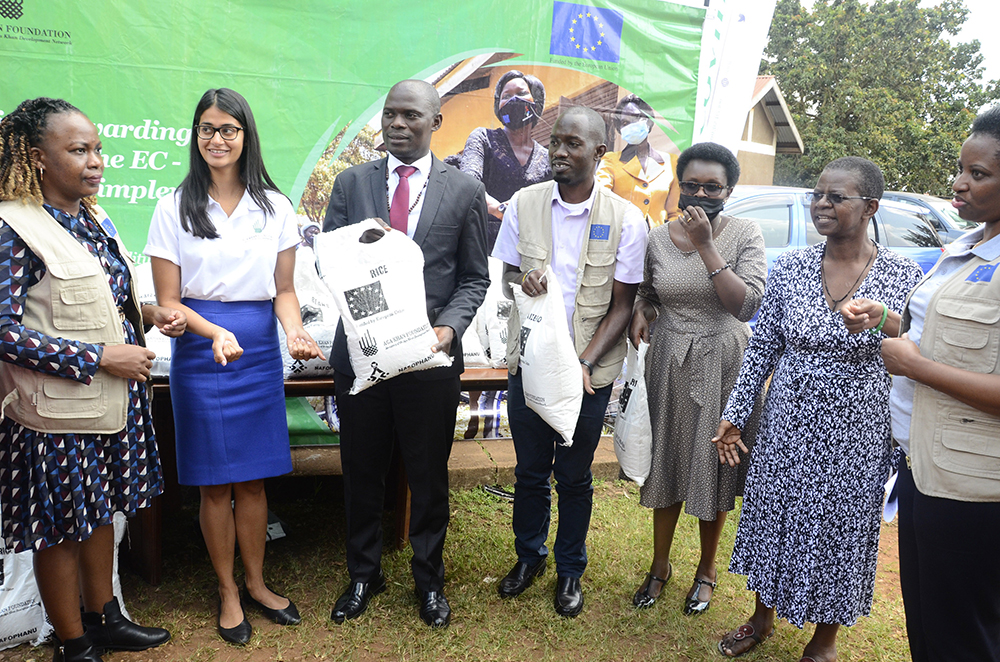High food prices: HIV positive people abandon drugs due to food insecurity
Jul 01, 2022
According to the World Health Organization (WHO), when people living with HIV are on ARVs, one of the guidelines they are given is to take their medication every day for the rest of their lives.

One of the PLWHS, Margret Najjingo (extreme right) receiving a bag of rice from Kampala state minister, Kyofatogabye (on the left).
By Elvis Basudde and Juliet Waiswa
Journalists @New Vision
Due to the escalating food prices, food insecurity emerged as a key barrier to anti-retroviral drugs (ARVs) adherence among people living with HIV, and a contributor to ARV treatment interruptions, especially during the last two months.
According to the World Health Organization (WHO), when people living with HIV are on ARVs, one of the guidelines they are given is to take their medication every day for the rest of their lives.
This is because if people do not adhere to the set directives, the risk of repeated illness due to opportunistic infections and the development of drug-resistant forms of HIV infection have increased.

4. State minister for Kampala, franked by Aga khan and NAFOPHANU team, displaying some of the food items given to PLWHA
Also, ARVs must be taken with food, because, according to health experts, TB drugs and ARVs are very strong and if taken without food, they make one become dizzy, and weak and "reduce his strength, making him feel like vomiting".
It is against this background that over 126 vulnerable city dwellers who cannot afford food due to high prices received food worth sh26m, courtesy of the National Forum of People Living with HIV/AIDS Networks Uganda (NAFOPHANU) with support from the Aga Khan Foundation.
The food relief comprising bags of rice, beans, maize flour and cooking oil is aimed at improving adherence to Anti-retroviral therapy (ART) amidst the escalating commodity prices.
During the food distribution on Wednesday, Kyofatogabye Kabuye, state minister for Kampala and metropolitan affairs, noted that PLWHA in the low-cost areas of Kisenyi, Kimombasa, Namuwongo, Acholi quarters and Mutungo where some depend on prostitution for a living, are likely to be most affected by the food insecurity.
“We also need to be vigilant and follow the standard operating procedures (SOPs) issued by the Ministry of Health in order to reduce COVID-19 new infections and death. We have started registering many cases of COVID-19,” said Kyofa.
He, however, assured PLHIVs that in three months’ time, government will have come up with solutions and measures to mitigate the rising food prices and other items like fuel that contribute to high prices of various commodities.

3. State minister for Kampala, Kyofatogabye addressing the beneficiaries
Stella Kentutsi, the executive director, NAFOPHANU regretted that food insecurity is today affecting adherence to ART leading to drug resistance, unsuppressed viral load and low immunity making one vulnerable to both AIDS and COVID-19.
Kentusi noted that being cognizant of the fact that HIV is chronic and requires daily treatment, it is important that the PLHIV have good nutrition. However, that has not been the case as some PLHIV are forced to abandon medication or offer themselves drug holidays because they cannot afford to swallow their medicine on empty stomachs.
“COVID-19 has affected entire population including the 1.4 million Ugandans living with HIV. According to the Ministry of Health; there were 167,719 confirmed COVID-19 cases while deaths were at 3,621 as of June 2022. This implies that the country is battling COVID-19 and HIV pandemics. Amongst the challenges is the inability to access food and treatment among others.
Adding, “On behalf of the constituency of PLHIV, we would like to thank EU and AKF for the food relief items as it comes in handy and to thank the journalists for always highlighting the plight of PLHIV during the COVID-19 crisis.
Testimonies
Hope Katusiime, a Kampala-based school student narrated that she survives on one meal a day since her father only gets food for one meal from where he does casual work. “My father does causal work at a building site and gets money for one meal.”
Besides having one meal a day, Katusiime walks from Kamwokya to Old Kampala where her school is located, and she is worried that if the situation does change, she might be forced to drop out of school.

1. Stella Kentutsi, ED NAFOPHANU speaking during the food relief handover (photo by Juliet Waiswa)
Katusiime is not alone. 40-year-old Faith Apio (not real name) a resident of Namuwongo said that the economic situation has forced her into having only one meal a day yet, as a PLWHA, the medication demands good nutrition. “I cannot buy food like before because commodity prices have gone up,” she said.
Margret Najjingo, another PLHIV said that the transport costs to get the medication at the health facility is a nightmare since fuel prices are high and the money she should have used to buy food is spent on transport.
“The government used to give us food in form of porridge and posho whenever we went for review to our health facilities, but that is no more. I wish we could have that arrangement reintroduced to help save the youth, especially young mothers,” she said.

No Comment